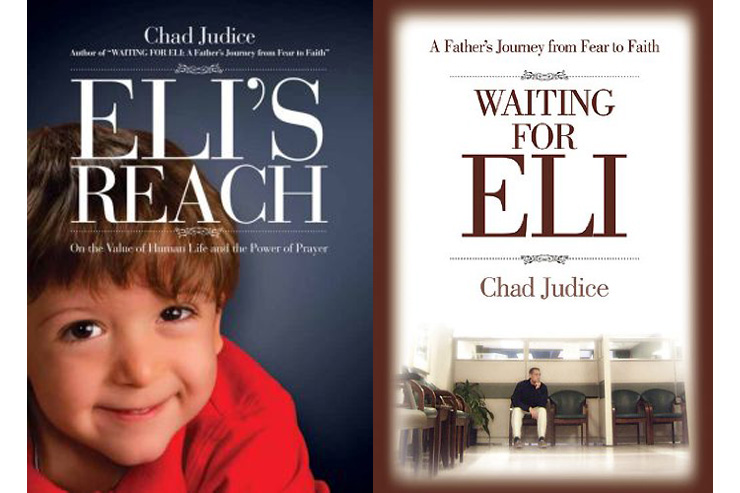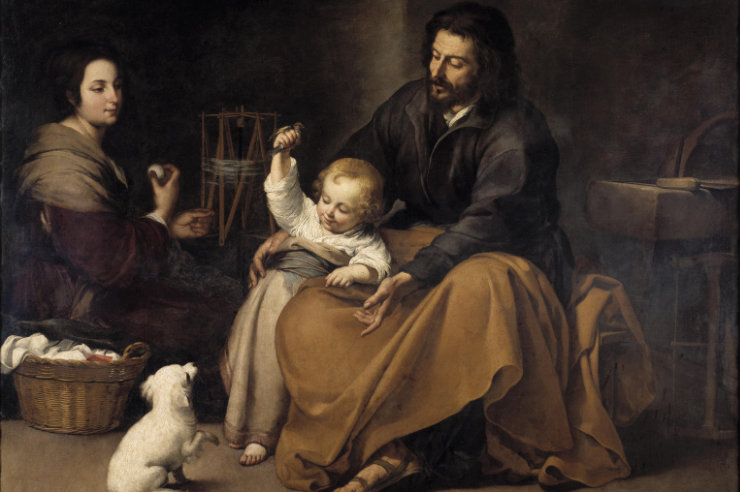 On January 9, after baptizing 21 infants in the Sistine Chapel on the feast of the Baptism of the Lord, Pope Benedict captured international headlines for reminding Catholic parents throughout the world that they should be choosing Christian names for their children. The choice of a name, he emphasized, shouldn’t be done “by chance” or whim, but should reinforce and communicate to the growing child and others one of the essential realities of the sacrament of baptism and the Christian life. The Christian name — in contrast to a non-Christian name — signifies that in baptism “every baptized person acquires the character of a son” and is “an unmistakable sign that the Holy Spirit gives birth to man ‘anew’ from the womb of the Church.” A Christian name manifests that through baptism a child is “raised to the supernatural order” and “placed in communication with God,” who then calls that child by that given name. Naming the child after a Christian saint or Biblical hero is a concrete reminder for the child and everyone else that God is calling that child, like his or her Christian namesake, to holiness and heaven. A Christian name concretely that there is, and is meant to be, a connection and continuity between natural and supernatural life, and between earthly and eternal life.
On January 9, after baptizing 21 infants in the Sistine Chapel on the feast of the Baptism of the Lord, Pope Benedict captured international headlines for reminding Catholic parents throughout the world that they should be choosing Christian names for their children. The choice of a name, he emphasized, shouldn’t be done “by chance” or whim, but should reinforce and communicate to the growing child and others one of the essential realities of the sacrament of baptism and the Christian life. The Christian name — in contrast to a non-Christian name — signifies that in baptism “every baptized person acquires the character of a son” and is “an unmistakable sign that the Holy Spirit gives birth to man ‘anew’ from the womb of the Church.” A Christian name manifests that through baptism a child is “raised to the supernatural order” and “placed in communication with God,” who then calls that child by that given name. Naming the child after a Christian saint or Biblical hero is a concrete reminder for the child and everyone else that God is calling that child, like his or her Christian namesake, to holiness and heaven. A Christian name concretely that there is, and is meant to be, a connection and continuity between natural and supernatural life, and between earthly and eternal life.
Much of this connection has been getting gradually lost in Christian practice, which is the reason why Pope Benedict needed to bring it to our attention. Recently, the Social Security Administration published a list of the 1,000 most popular boys’ and girls’ names chosen by American parents in 2009. The main headline for most of the press accounts was that the name “Mary” — which in every year from 1910-1965 was either the first or the second most popular girls’ name — was no longer even in the top 100. American parents as a whole were choosing the names Alyssa, Aubrey, Avery, and Aaliyah, Hailey, Bailey, Kaylee, and Riley, Layla, Makayla, Morgan and Destiny more than they were choosing to name their child over the spiritual mother Jesus on the Cross gave to the human race. While Marian derivatives Maria (71st) and Mariah (88th) did make the top 100, they still trailed those named after Manhattan boulevards (Madison, 7th), adrenal disorders (Addison, 12th), Big Apple Boroughs (Brooklyn, 37th) and even the suggested overturning of heaven (Nevaeh — heaven spelled backwards — 34th) by large margins.
On the boys’ side, things are not much better. Beginning in 1910, when the frequency of names began to be documented, through 1972, the names of the foster-father of Jesus and of the four evangelists were firmly entrenched in the top ten each year. They haven’t fallen nearly as much as the name of Mother of God, but Joseph is now 16th (its lowest since records began getting kept in 1910), Matthew is 13th, John is 26th, Luke is 48th, Mark is 154th. Parents are opting just as much or more for Braydon, Brody and Bryson, Colton, Caden and Camden, Jayden, Jaxon, and Jace.
At a human level, one of the first and most long-lasting gifts — or burdens — parents give to a child is a name. This is the way the child will generally be referred to for the rest of his or her life. The child will hear that name literally millions of times over the course of a lifetime. The choice of a name can have a profound impact on the child’s development and self-identity. If, for example, the child receives a name that is equally given to boys and girls — in 2009, like Peyton (43rd for girls, 147th for boys), Taylor (22nd for girls, 298th for boys), or Jordan (45th for boys, 150th for girls) — he or she will likely have a lifetime of misaddressed envelopes, salutations and other tiresome or embarrassing gender-confused situations. If someone is given a neologism like Addisyn, Aditya, Alayna, Arjun, Ayaan, Deandre, Jaliyah, Jamarion, Jaxen, Kaydence, Kimora, Misael, Nayeli, Saniyah, Xander, Xiomara, Xzavier, Yamilet, Yareli, Yaritza, or Zavion — all of which are among the top 1,000 U.S. names in 2009 — not only will these children have to suffer through others’ not knowing by their name whether they’re male or female but they’ll also have to endure a lifetime of mispronunciations as well as having to repeat and spell out their names over-and-over-again. What may have begun with the parents’ wanting to give a “special” name to a beloved child will turn into a lifetime of unnecessary hassles, when others will be forced to ask them, “What did you say your name was again?”
A child’s name should not be treated like an email handle with which one can basically get as creative as one wants. A child’s name, rather, communicates in a sense a person’s identity and can dramatically impact a child’s development. If Mr. & Mrs. Dover call their son Ben, they’re setting him for a life of ridicule. If the name him Benorenaliyah, they’re setting him up for a life of social confusion and awkwardness. If they name their child after a soap opera star, professional athlete, rock star, or reality show personality, not only are they manifesting a regrettable superficiality, but they are also linking their child to someone who almost certainly will be irrelevant when they become adults. How many adults today would prefer to be called Humphrey or Petula? It’s quite possible that in fifty years, people will feel the same way about being called Eminem or Rihanna, Shaquille or Shakira.
As the saying goes, a name is not just for a birthday, but for a lifetime, and Pope Benedict is reminding us that this audible personal symbol is meant for an eternal lifetime. We know from Sacred Scripture how seriously God took names. He famously changed the names of Abram to Abraham, Sarai to Sarah, Jacob to Israel and Simon to Peter. He commanded Zechariah to name his son John, to incarnate God’s graciousness, and Joseph to name Mary’s Son, Jesus, to enflesh and effectuate God’s salvation. In order to help Adam grow into the image and likeness of his Creator, God allowed Adam to name the beasts, the birds, the cattle, then Eve, then their sons. To give someone a name, as we see from the beginning, is a sacred act, an action that participates in God’s creative plan, a solemn responsibility that should be carried out with prayer and joyful seriousness rather than done capriciously and carelessly ignorant of the consequences. One of the questions pregnant couples should ask themselves is what their child will think later of the name chosen and the reasons for which it was chosen. Was it chosen to honor a beloved family member whose influence and virtue really impacted them or chosen simply because they liked the way it sounded and no one had ever heard such associated sounds before? Was it selected to link the person to a genuine hero in this life or in the next, or was it chosen nihilistically, with no connection to anyone or anything whatsoever?
A baptismal ceremony begins significantly with the minister’s asking the parents, “What name do you give your child?” This name is given before God. The Catechism says the child’s name and God’s name are thereby linked. “The sacrament of Baptism is conferred ‘in the name of the Father and of the Son and of the Holy Spirit.’ In Baptism, the Lord’s name sanctifies man, and the Christian receives his name in the Church. This can be the name of a saint, that is, of a disciple who has lived a life of exemplary fidelity to the Lord. The patron saint provides a model of charity; we are assured of his intercession. The ‘baptismal name’ can also express a Christian mystery or Christian virtue. ‘Parents, sponsors, and the pastor are to see that a name is not given which is foreign to Christian sentiment.’” It adds, “God calls each one by name. Everyone’s name is sacred. The name is the icon of the person. It demands respect as a sign of the dignity of the one who bears it” (CCC 2156, 2158).
The name is a holy icon of the person. In our age of titular iconoclasm, Pope Benedict is calling Christian parents back to connect the names of their children with the name of God and the names of those who have lived — and continue to live forever — in God’s holy name, entrusting their children to their namesakes’ saintly patronage so that one day the Good Shepherd will call those children to his eternal right side by the names they’ve chosen for them.













